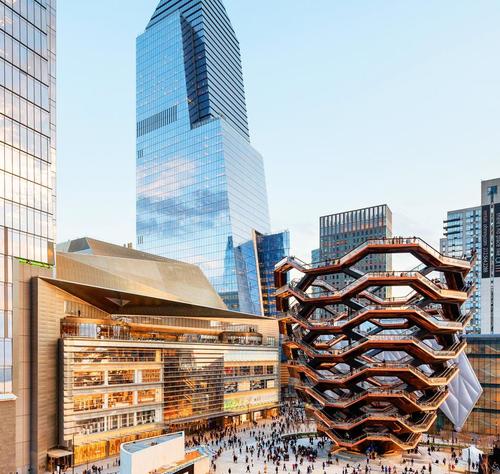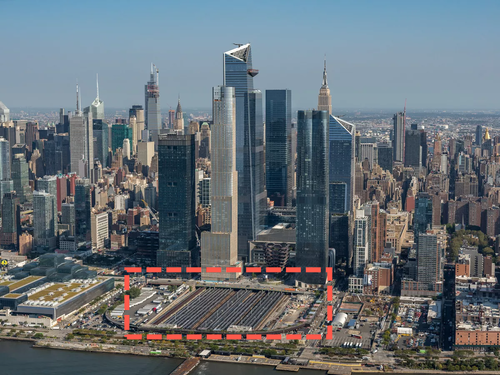Hudson Yards A Ghost Town, Investors Panic As Company ‘Admits’ Financial Problems
Hudson Yards is open for business – but who is coming?
Hudson Yards, the largest private development in the US, opened nearly two years ago with much optimism. It’s a massive complex on Manhattan’s Far West Side with condos, office space, and retailers built over a massive railroad yard. But since the virus pandemic, shoppers have vanished, and retailers have shuttered their doors, transforming the area into a ghost town – raising questions about the $25 billion development’s future, according to NYTimes.
Hudson Yards has become so depressing that the spiraling staircase structure, known as the “Vessel,” has been closed after the third suicide in less than a year. The virus pandemic has turned the development into a lifeless area as many shops and restaurants have been empty since early last year.
Inventory of condominiums continues to swell in the development. The surrounding office buildings are empty as work-at-home dominates. The mall, featuring about 100 retail shops, saw its anchor tenant, Neiman Marcus, file for bankruptcy and closed permanently.
Owner and developer Related Companies has been banking on wealthy buyers to fill its condos, along with tourists and residents to fill its shops, but all that came to a screeching halt in early 2020 as the pandemic began.
“The challenges facing Hudson Yards aren’t unique,” Danny Ismail, an analyst and lead of office coverage for the real estate research firm Green Street, told NYTimes.
“All commercial real estate in New York City has been impacted by Covid-19. However, I would argue that post-pandemic, Hudson Yards and the area around it will be one of the better office markets in New York City,” Ismail said.
Related told NYTimes, it faces financial difficulties related to the virus pandemic but said commercial tenants were still moving in, hoping for a rebound in the economy due to vaccine rollout.
There are four office buildings at Hudson Yards, with 50 Hudson Yards still under construction. A spokesman for Related said 93% of the commercial space is leased.
“Our strong office leasing, even during the pandemic, is why we’re well-positioned to lead New York’s comeback from Covid and why the adjacent neighborhoods and the entire West Side will recover faster,” the spokesman, Jon Weinstein, said.
Hudson Yards has been planning to expand across the railroad yard but first needs to construct the second half of a massive deck. Though the company would need billions of dollars for the expansion, a delay in the expansion is possible with the local economy still in tatters.
… and a recovery in borough could take years (read: “”A Long Slog” – NYC Recovery Lags Rest Of Country As Downturn Could Last Years”).
“The residential is going to have to recover, or they switch it up and look at a different product mix over there,” CBRE’s Robert Alexander said.
Related is also facing pressure from investors who allege the company refuses to open its books.
NYTimes expands more on this:
Related is also facing pressure from its investors to deliver a fuller accounting of the project’s finances. A group of 35 investors from China — a sliver of the roughly 2,400 who contributed $1.2 billion to Hudson Yards — sued the company last year, accusing it of refusing to open its books or say when it might repay their investments.
An arbitrator in the case recently denied the investors’ claims and ruled that Related was not required to disclose detailed financial information.
The company’s lawyers said that Hudson Yards was facing “significant headwinds as a result of Covid-19” and that because of the economic downturn and lockdown restrictions, it may be unable to recoup its investment in at least one property there, 35 Hudson Yards, a mixed-use tower with a hotel, according to filings in the case obtained by The New York Times.
Another group of Chinese investors, whose contributions of $500,000 per person were part of a United States visa program that can grant them a path to citizenship, are said to also be considering filing a similar lawsuit against Related, according to a person familiar with the situation who was not authorized to speak publicly.
Before the pandemic, Related said most of its revenue streams were to be derived through its condos and shopping area.
Real estate firm Miller Samuel told NYTimes that condo sales at Hudson Yards have fallen off a cliff. In 2019, 157 units were sold in the development, but only 30 were sold in all of 2020.
Nancy Wu, an economist at StreetEasy, warned Manhattan is facing a massive supply of condos for sale at the moment. To get through all the supply, it could take years for the borough’s condo market to recover, an indication that Related’s financial outlook looks bleak.
The lack of people traversing Hudson Yards is also troubling.
Weekday traffic at the Hudson Yards subway station plunged to an average of 6,500 riders in December, compared with 20,000 daily average in 2019.
While everyone was expecting things to go back to normal in 2021, Hudson Yards is still a ghost town and could take years to recover.
Tyler Durden
Thu, 02/11/2021 – 18:10![]()
Zero Hedge’s mission is to widen the scope of financial, economic and political information available to the professional investing public, to skeptically examine and, where necessary, attack the flaccid institution that financial journalism has become, to liberate oppressed knowledge, to provide analysis uninhibited by political constraint and to facilitate information’s unending quest for freedom. Visit https://www.zerohedge.com



